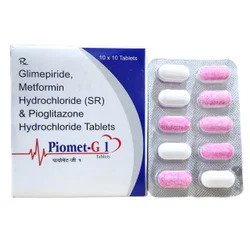200 customer reviews) | 4000 Viewed
Active Ingredient (Generic Name): PIOGLITAZONE 15MG, GLIMEPIRIDE 2MG, METFORMIN 500MG
Indication:
Manufacturer: Singature
Packaging: 10 Pills in 1 strip
Delivery Time: 6 To 21 days
Categories:


| Quantity | Price | Price / Unit | Add To Cart |
|---|---|---|---|
| 30 pills | $69 | $ 1.03 | $69.00Buy Now |
| 60 pills | $111 | $ 1.85 | $111.00Buy Now |
| 90 pills | $157 | $ 1.74 | $157.00Buy Now |
| 180 pills | $293 | $ 1.63 | $293.00Buy Now |
| 250pills | $378 | $ 1.51 | $378.00Buy Now |
| 500pills | $641 | $ 1.28 | $641.00Buy Now |
Are you looking for information about Triphage PG2 and its uses? In this article, we will delve into the description, additional information, indications, pharmacology, dosage, and other important details about Triphage PG2. Triphage PG2 is a medication that contains olanzapine and is commonly prescribed for certain medical conditions. We will discuss its uses, how it works, proper dosage, potential side effects, and other important considerations. Let’s explore the world of Triphage PG2 together.
Triphage PG2 is a medication that combines olanzapine with other active ingredients to treat various medical conditions. It falls under the class of atypical antipsychotics, which are commonly used to manage mental disorders such as schizophrenia and bipolar disorder. Triphage PG2 is known for its effectiveness in alleviating symptoms and improving the quality of life for individuals dealing with these conditions.
Triphage PG2 is available in the form of oral tablets or capsules. The medication contains a specific dosage of olanzapine, along with other components that aid in its absorption and overall effectiveness. The exact composition and formulation of Triphage PG2 may vary depending on the manufacturer and country of origin.
Triphage PG2 is typically prescribed by healthcare professionals to manage symptoms associated with psychiatric disorders. It is important to note that this medication should only be used under the supervision and guidance of a qualified medical practitioner. Self-medication or altering the dosage without medical advice can lead to adverse effects and may not yield the desired outcomes.
Olanzapine is the primary active ingredient in Triphage PG2. It is a potent antipsychotic agent that helps regulate the levels of certain neurotransmitters in the brain, including dopamine and serotonin. By modulating these neurotransmitters, olanzapine assists in reducing psychotic symptoms, stabilizing mood, and improving overall mental well-being.
Triphage PG2 is indicated for the treatment of various psychiatric disorders, including:
The pharmacological action of Triphage PG2 is primarily attributed to olanzapine’s ability to antagonize certain receptors in the brain. It acts as an antagonist for dopamine receptors, particularly the D2 receptor, which helps normalize the neurotransmitter’s activity. Additionally, olanzapine also has antagonistic effects on other receptors, such as serotonin receptors (5-HT2A and 5-HT2C). These mechanisms collectively contribute to the therapeutic effects of Triphage PG2 in managing psychiatric disorders.
The dosage of Triphage PG2 may vary depending on the individual’s condition, severity of symptoms, and response to treatment. It is crucial to follow the prescribed dosage and administration instructions provided by your healthcare provider. Deviating from the recommended dosage without medical consultation can lead to inadequate symptom control or increased risk of side effects.
Please note that the dosage of Triphage PG2 should always be determined by a qualified healthcare professional. Self-medication or altering the dosage without medical advice can be potentially harmful.
It is essential to adhere to your doctor’s advice regarding the usage of Triphage PG2. Take the medication as prescribed and follow the recommended schedule. If you have any concerns or experience difficulties while taking Triphage PG2, consult your healthcare provider for guidance. They may provide additional instructions or adjust the dosage to suit your specific needs.
Before taking Triphage PG2, inform your healthcare provider about any other medications, supplements, or herbal products you are currently using. Certain medications may interact with Triphage PG2, potentially altering its efficacy or increasing the risk of side effects. Your doctor can assess potential drug interactions and make necessary adjustments to ensure safe and effective treatment.
Triphage PG2 is contraindicated in individuals with known hypersensitivity or allergy to olanzapine or any other components present in the formulation. It is important to disclose any known allergies or adverse reactions to your healthcare provider before starting Triphage PG2.
Like any medication, Triphage PG2 may cause side effects in some individuals. The most commonly reported side effects include:
If you experience any persistent or severe side effects, promptly inform your healthcare provider for further evaluation and guidance.
Pregnant or breastfeeding individuals should exercise caution when considering the use of Triphage PG2. It is crucial to consult with your healthcare provider to assess the potential risks and benefits of using Triphage PG2 during these periods. Your doctor can provide personalized advice based on your specific situation.
Before starting Triphage PG2, it is important to inform your healthcare provider about any pre-existing medical conditions, such as:
Your doctor will evaluate your medical history and assess potential risks before prescribing Triphage PG2.
Triphage PG2 should be used with caution in certain populations, including:
It is important to consult with your healthcare provider for appropriate dosage adjustments and guidance if you belong to any special population groups.
Triphage PG2, containing olanzapine as its primary ingredient, is an effective medication used to manage various psychiatric disorders. It is crucial to take Triphage PG2 as per your doctor’s advice, following the prescribed dosage and administration instructions. Remember to discuss any concerns or potential side effects with your healthcare provider. By working closely with your doctor, you can optimize the benefits of Triphage PG2 and improve your overall well-being.